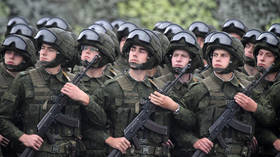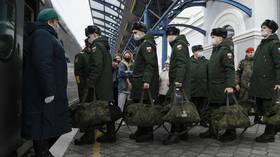Russia to toughen punishment for crimes during wartime

The Russian lower house of parliament, the State Duma, adopted amendments to the Criminal Code on Tuesday, which would impose tougher punishment for crimes committed during “wartime,” “martial law” or a “mobilization period.”
The suggested changes include harsher punishments for looting or going AWOL during wartime, or committing any crime during a period of military mobilization. They also criminalize the sabotage of defense contracts.
The bill was introduced on Tuesday and swiftly passed by the Duma in three readings. The upper house of the parliament, the Federation Council, is expected to pass the legislation as soon as Wednesday, according to Senator Andrey Klishas, who chairs the Council Committee on Constitutional Legislation and State Building.
Changes proposed in the bill expand the section of the code that describes crimes such as disobeyal of a lawful order, or violation of military regulations by service personnel. Such felonies committed in wartime or during an armed conflict will be punished by longer prison terms than during peacetime, if the amendment comes into force.
For example, briefly leaving service without official leave could land a soldier in a disciplinary unit for a year. The same act would be punishable by five to ten years in jail, if committed “during a period of mobilization or martial law, in wartime or in conditions of armed conflict or combat operations,” according to the draft document.
The bill suggests leniency to runaway soldiers, who commit a crime for the first time or under duress, stating that the judge may decide not to punish such offenders. The same applies to soldiers who surrender themselves to the enemy on their own volition, provided that later they rejoin the Russian forces. Failure to do so could lead to a prison term of up to ten years, according to the bill.
The draft legislation also seeks to change the section of the criminal code on war crimes. It introduces looting during an armed conflict as a separate felony. The crime would be punishable by up to six years in jail, if the deed did not involve any violence or cause major damage. Violent or organized looters would be imprisoned for up to 15 years, under the proposal.
The bill also seeks to change the part of the criminal code which explains aggravating circumstances. The current version lists a number of calamities, during which felons receive tougher punishments, including natural emergencies, mass riots and armed conflicts.
Military mobilization, which is not mentioned in the criminal code now, will be added to the list, if the bill is signed into law in its present form. The wording would be also updated to list “martial law” and “wartime” instead of the current “conditions of military conflict or military action”.
The bill also criminalizes repeated refusal to accept and execute mandatory defense contracts by companies under Russian jurisdiction. Under certain circumstances, producers in Russia are not allowed to refuse orders that the government deems necessary for national security.














